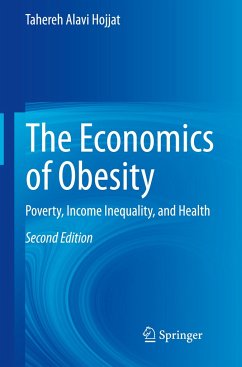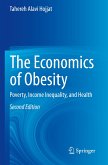Much has been written about the economic causes of obesity, but this book offers a comprehensive and deep investigation of the causes and treatment of these issues in a single volume. In the second edition, the author expands upon the serious threat that obesity poses not only to our health, but also to our society. Obesity costs billions of dollars a year in lost productivity and medical expenses.
The social distribution of obesity has changed over time. Obesity rates in the United States continue to worsen in parallel with income inequality. Socioeconomic groups with low personal capital, levels of education, and income have higher obesity rates. In fact, the rate of obesity has increased the fastest among low-income Americans. The disproportionate burden of obesity on the poor poses an economic challenge and an ethical imperative. The link between obesity, inactivity, and poverty may be too costly to ignore because obesity-associated chronic disease already accounts for 70% of US healthcare costs. Although economic and technological changes in the environment drove the obesity epidemic, the evidence for effective economic policies to prevent obesity remains limited.
The new edition brings together a multitude of topics on obesity previously not discussed with a particular emphasis on the influence of poverty and income inequality on obesity including:Economic Analysis: Behavioral Patterns, Diet Choice, and the Role of Government
Income and Wealth Inequality and Obesity
Social Mobility and Health
Food Policies, Government Interventions, and Reducing Poverty
The Economics of Obesity is an essential text for readers interested in learning about the causes and consequences of obesity within a social context including students, academicians, and practitioners in public health, medicine, social sciences, and health economics, both in and outside of the United States. US and international policy-makers also will find the book a salient read in addressing the issues that contribute to the cycle of poverty, income inequality, and obesity.
Hinweis: Dieser Artikel kann nur an eine deutsche Lieferadresse ausgeliefert werden.
The social distribution of obesity has changed over time. Obesity rates in the United States continue to worsen in parallel with income inequality. Socioeconomic groups with low personal capital, levels of education, and income have higher obesity rates. In fact, the rate of obesity has increased the fastest among low-income Americans. The disproportionate burden of obesity on the poor poses an economic challenge and an ethical imperative. The link between obesity, inactivity, and poverty may be too costly to ignore because obesity-associated chronic disease already accounts for 70% of US healthcare costs. Although economic and technological changes in the environment drove the obesity epidemic, the evidence for effective economic policies to prevent obesity remains limited.
The new edition brings together a multitude of topics on obesity previously not discussed with a particular emphasis on the influence of poverty and income inequality on obesity including:Economic Analysis: Behavioral Patterns, Diet Choice, and the Role of Government
Income and Wealth Inequality and Obesity
Social Mobility and Health
Food Policies, Government Interventions, and Reducing Poverty
The Economics of Obesity is an essential text for readers interested in learning about the causes and consequences of obesity within a social context including students, academicians, and practitioners in public health, medicine, social sciences, and health economics, both in and outside of the United States. US and international policy-makers also will find the book a salient read in addressing the issues that contribute to the cycle of poverty, income inequality, and obesity.
Hinweis: Dieser Artikel kann nur an eine deutsche Lieferadresse ausgeliefert werden.







